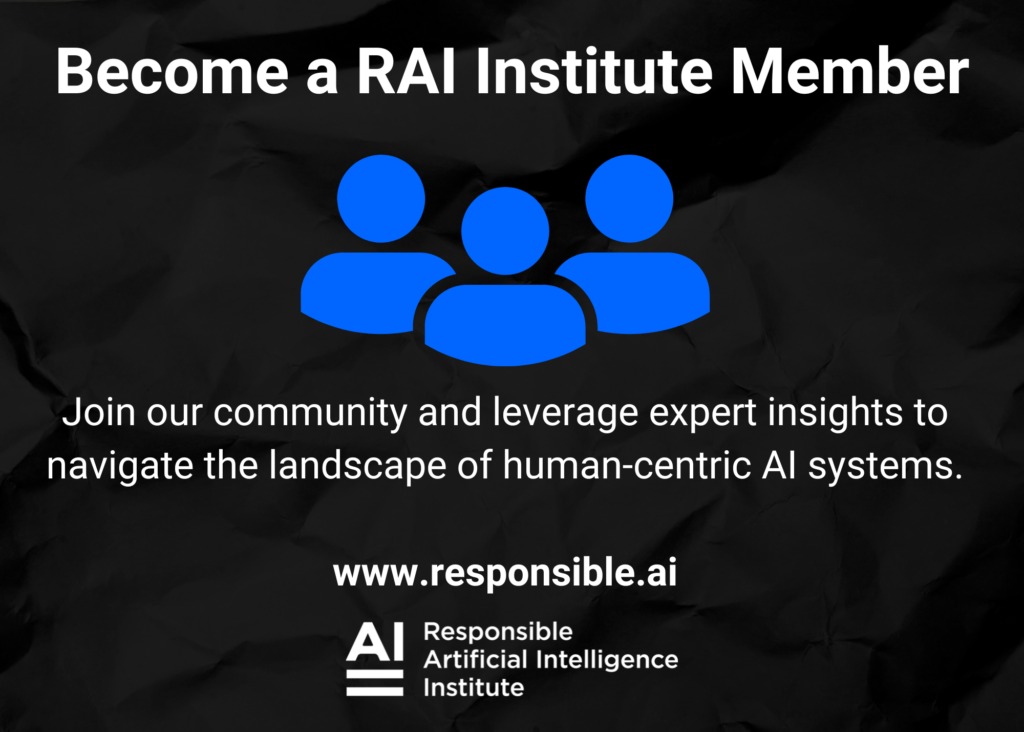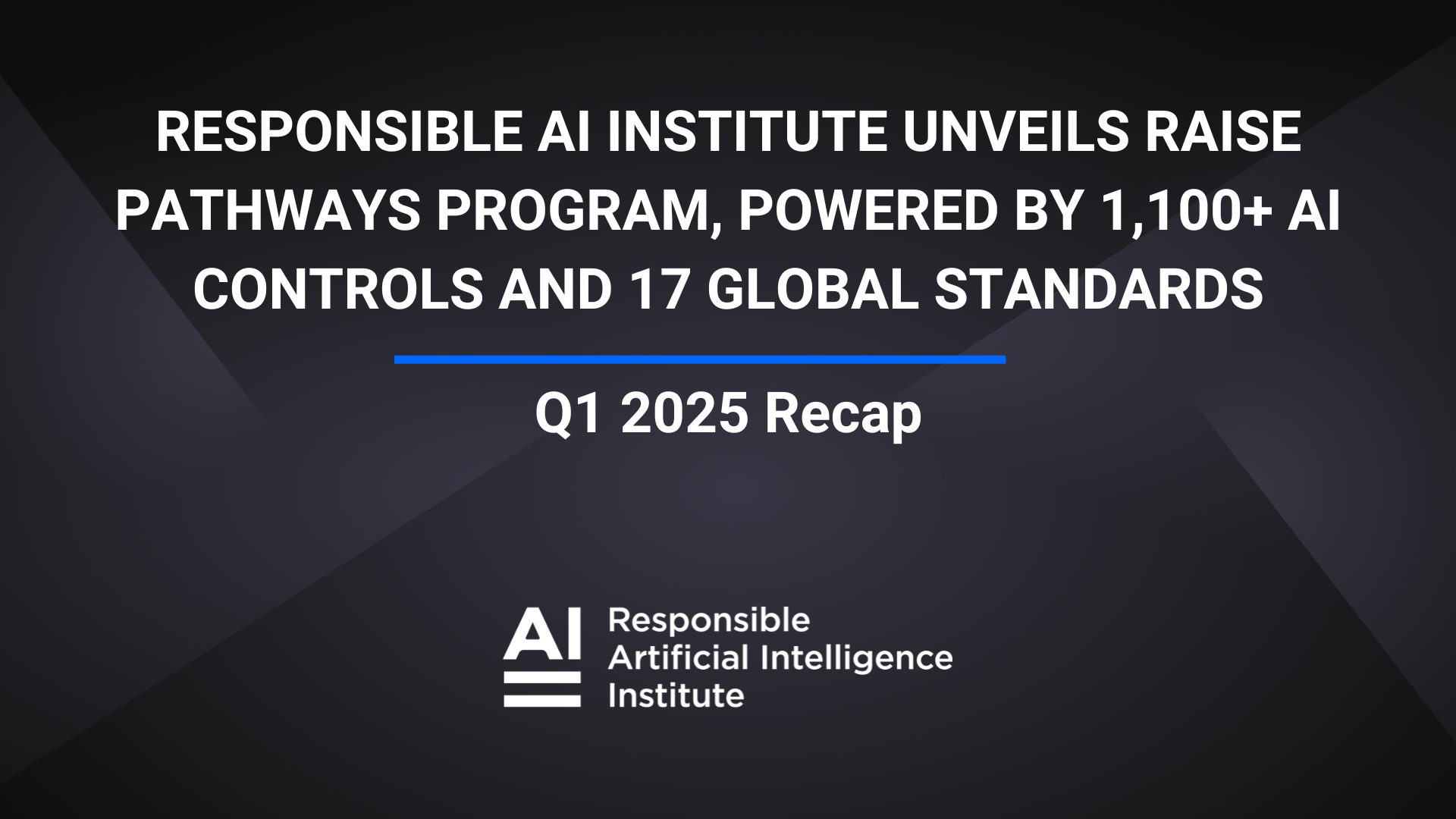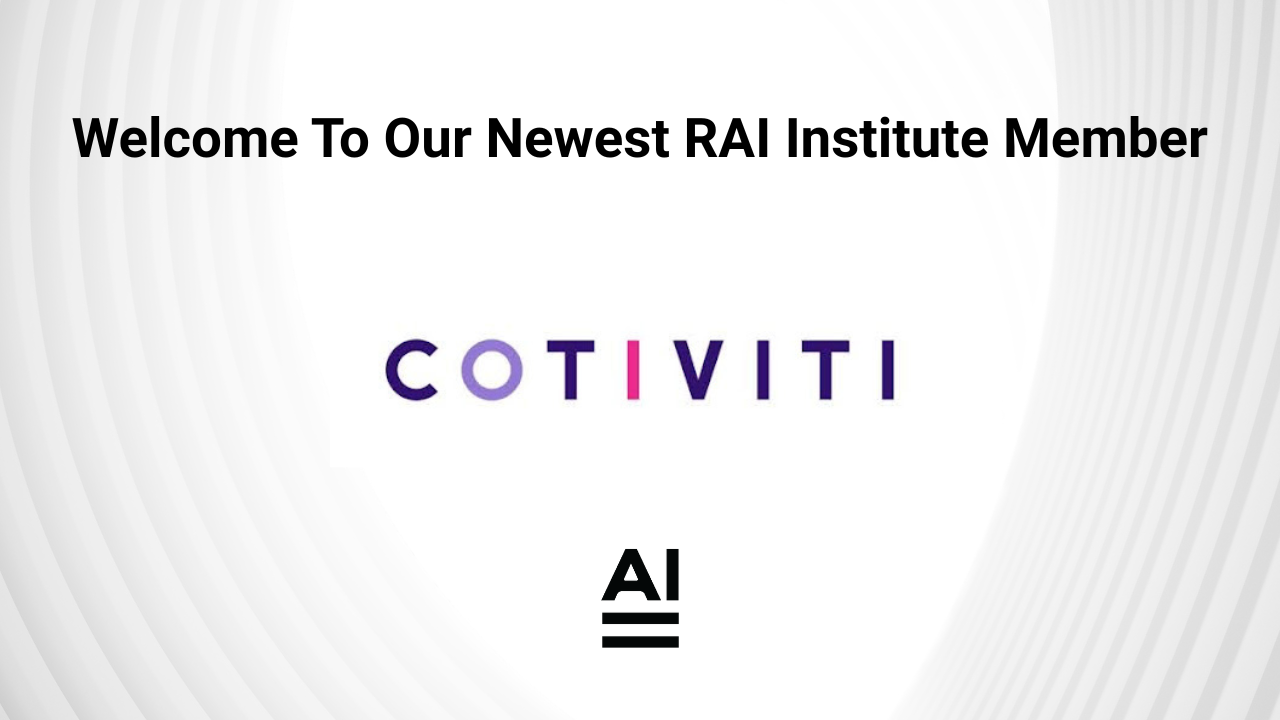Responsible AI Institute November 20, 2024 Webinar Recap
AI is transforming industries at a breakneck pace, and its integration into the workplace is both an opportunity and a challenge. Leading industry voices in AI were brought together for a panel discussion to explore the rise of AI-focused roles and their profound impact on organizational structures. This blog outlines the key takeaways from the session, offering insights for organizations navigating the evolving AI landscape.
The panel comprised of experts cutting across multiple backgrounds including:
- Carolyn Clark, VP of Corporate Communications & Employee Experience at Simpplr, provided her perspective on emerging AI roles and how these roles are evolving.
- Audrey Chen, Senior Privacy Project Manager at Samsara, shared her expertise on how various industries are restructuring their organizations around these new roles.
- Amelia Kallman, Futurist and Speaker, contributed her thoughts on the future of work as it relates to AI.
- Dr. Elizabeth M. Adams, CEO at EMA Advisory Services, moderated the discussion.
Emerging Roles Reshaping Organizations
The panel began with an exploration of the new AI-driven roles revolutionizing the workplace. From Responsible AI Officers to Chief AI Officers, these positions are becoming essential across industries. Clark highlighted, “Employers are putting AI in job titles, but I also think people are testing the waters. They’re testing what the future of every role looks like with the influence of AI.” These roles will address the growing demand for expertise in AI ethics, governance, and system design. Kallman emphasized the critical importance of these positions, noting, “This is going to empower us to become workforce architects. We’ll be able to design and optimize the most efficient, effective, diverse and high achieving workforce possible. And I think in the age of AI, this is going to be the ultimate differentiator.”
As AI tools permeate industries from retail to public services, it is imperative for organizations to ensure that the technology is both effective and ethically deployed. Chen added a practical perspective, detailing how companies in diverse industries are tailoring AI roles to meet their unique challenges. For example, manufacturing firms leverage AI architects to optimize operations, while public sector organizations hire AI researchers to guide technology policy.
Reshaping Organizational Structures: The AI Integration Challenge
The emergence of AI-focused roles is prompting companies to rethink traditional organizational structures. According to Kallman, roles like Responsible AI Officer or AI Researcher are not standalone additions; they are central to transforming business operations. These professionals help integrate AI systems into a company’s core processes, ensuring alignment with strategic goals.
Chen discussed the hurdles industries face when restructuring. Integrating AI-specific positions with existing roles—such as Chief Technology Officers or Data Privacy Officers—requires a careful balance. “I think the ones who are at the forefront or the ones who are early adopters, they are recognizing that AI is around the corner,” stated Chen. “How can we adapt as an organization to adopt potentially AI products? How do we incorporate that into our workforce, into our technology? From these companies’ perspectives, it is really about ensuring that there is some expertise around.”
Clark added that collaboration across departments is critical. As AI becomes more entrenched in organizational workflows, fostering a culture of teamwork and communication ensures smoother integration and more effective outcomes.
Shaping the Future of AI Implementation
The panel also delved into how AI-centric roles are influencing the broader trajectory of AI development and adoption. Chen underscored their importance, stating that these roles are foundational for creating robust and scalable AI systems. Without them, organizations risk falling behind in the competitive AI economy.
Clark emphasized the need for adaptability, pointing to examples of businesses successfully integrating AI roles into their operations. She noted that continuous learning and flexibility are essential for navigating the evolving demands of AI.
Exploring the risks of neglecting AI integration, Kallman urged organizations to assess their specific needs. Not every industry may need AI at the same level, but failing to adopt these roles where needed could result in lost opportunities and decreased competitiveness.
Building an AI-Ready Organization
The discussion concluded with practical guidance for organizations aiming to integrate AI roles effectively. Panelists recommended starting with a thorough assessment of current capabilities and gaps, followed by targeted hiring and upskilling initiatives. Collaborations with academic institutions and industry partners can also help identify and attract top talent.
A shared focus on education emerged as a key theme. Encouraging continuous learning among employees ensures the workforce is ready to adapt to AI’s evolving demands. Moreover, fostering a culture of innovation and collaboration helps organizations stay agile in a fast-changing landscape.
Watch the panel discussion on demand.

About Responsible AI Institute (RAI Institute)
Founded in 2016, Responsible AI Institute (RAI Institute) is a global and member-driven non-profit dedicated to enabling successful responsible AI efforts in organizations. We accelerate and simplify responsible AI adoption by providing our members with AI conformity assessments, benchmarks and certifications that are closely aligned with global standards and emerging regulations.
Members include leading companies such as Amazon Web Services, Boston Consulting Group, Genpact, KPMG, Kennedys, Ally, ATB Financial and many others dedicated to bringing responsible AI to all industry sectors.
Media Contact
For all media inquiries please refer to Head of Strategy and Marketing, Nicole McCaffrey.
nicole@responsible.ai
+1 440-785-3588
Find Responsible AI Institute Here:




